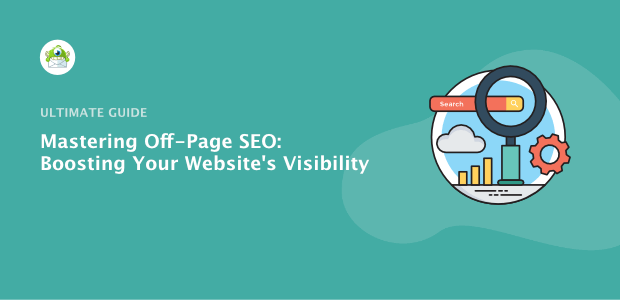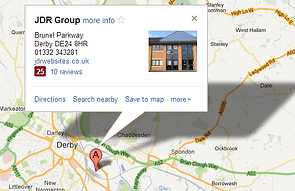Top Off-Page SEO Techniques to Boost Your Site’s Authority
Estimated reading time: 7 minutes
Key Takeaways
- Understand that off-page SEO techniques are crucial for enhancing your website’s authority and search engine rankings by focusing on external strategies.
- Learn core off-page SEO strategies, including backlink building, guest posting, influencer outreach, and social bookmarking.
- Explore various backlink building strategies such as broken link building, competitor analysis, and the skyscraper technique to acquire high-quality backlinks.
- Master guest posting for SEO by learning how to find high-authority blogs, craft effective pitches, and create valuable content.
- Discover effective influencer outreach strategies to connect with industry leaders and co-create content that boosts your site’s visibility.
- Familiarize yourself with social bookmarking sites and best practices to drive social signals and increase content exposure.
- Identify and avoid common off-page SEO mistakes like using low-quality backlinks and ignoring analytics to protect your site’s SEO health.
Table of contents
- Top Off-Page SEO Techniques to Boost Your Site’s Authority
- Key Takeaways
- Core Off-Page SEO Techniques Overview
- Backlink Building Strategies
- Guest Posting for SEO
- Influencer Outreach for SEO
- Social Bookmarking Sites List & Best Practices
- Common Off-Page SEO Mistakes to Avoid
- Frequently Asked Questions
Off-page SEO techniques are indispensable for elevating your website’s online presence. Unlike on-page SEO which focuses on optimizing elements within your website, off-page SEO pivots to strategies implemented outside your site to bolster your domain authority and search engine rankings. Think of it as building your website’s reputation across the internet. These techniques essentially tell search engines like Google, Bing, and Yahoo about the credibility, relevance, and trustworthiness of your site. By effectively implementing off-page SEO, you’re not just aiming for higher rankings; you’re building a sustainable online business.

In today’s digital landscape, search engines use complex algorithms to determine which websites deserve to rank higher. Off-page SEO signals play a pivotal role in this evaluation. These signals include backlinks from reputable websites, your brand mentions on social media, and engagement across various online platforms. Essentially, off-page SEO is about earning trust and authority in the eyes of both search engines and your target audience. This guide will serve as your roadmap to mastering actionable off-page SEO techniques. We’ll delve into crucial areas like backlink building strategies, the strategic use of guest posting, effective influencer outreach, and the often-underestimated power of social bookmarking. Ready to amplify your site’s visibility and authority? Let’s get started.
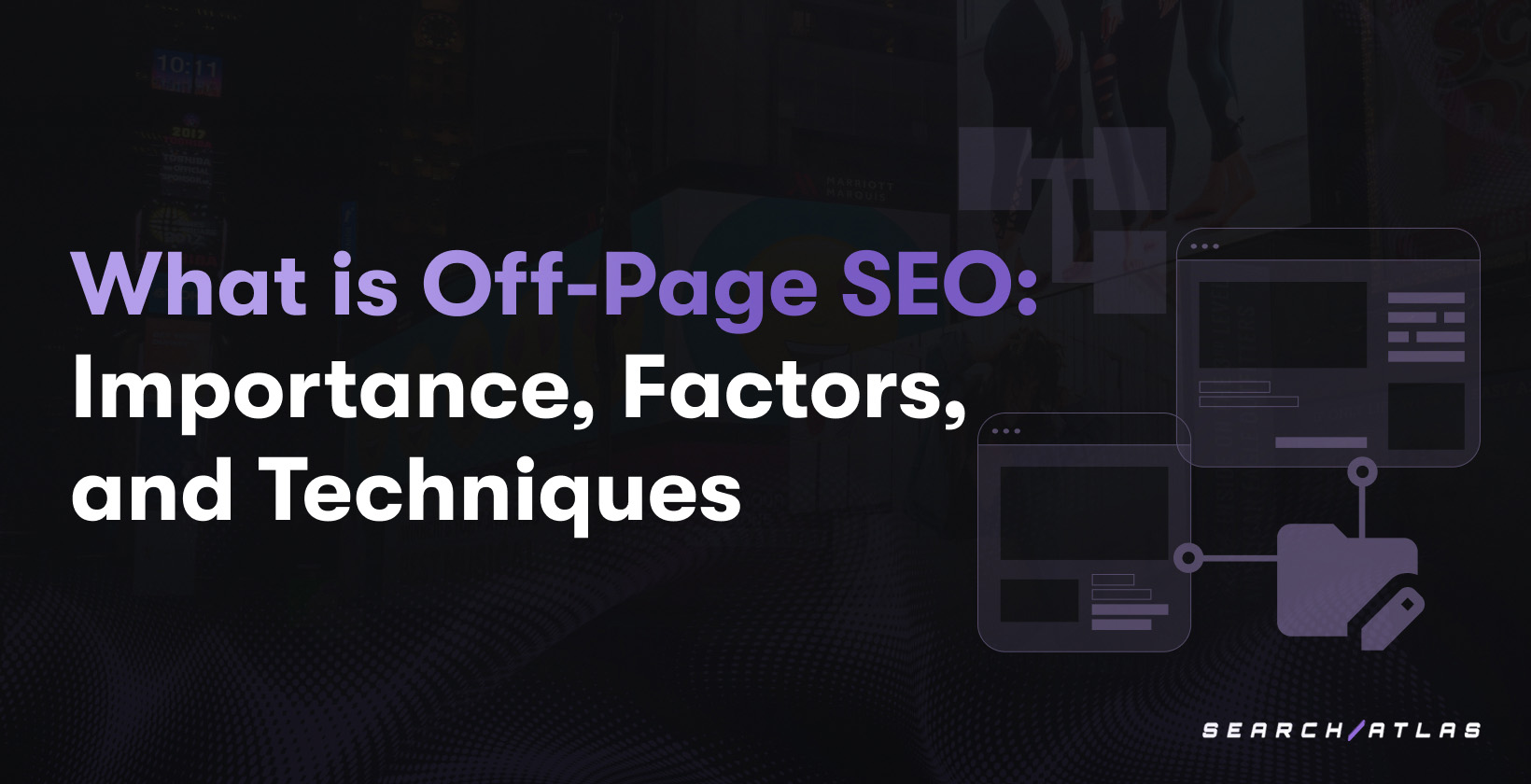
Core Off-Page SEO Techniques Overview
At the heart of off-page SEO lie several fundamental techniques. These strategies are designed to enhance your website’s reputation and credibility from external sources. Let’s break down the core components you need to be familiar with. Remember the key keywords here are: off-page SEO techniques and backlink building strategies. Off-page SEO fundamentally relies on elements outside your direct control to improve search engine rankings and domain authority. The primary goal is to convince search engines that your website is a reputable and valuable resource within your niche. Here are the cornerstone strategies:
-
Backlink Building: This involves acquiring hyperlinks, known as backlinks, from other reputable websites to your own. Think of backlinks as “votes of confidence” from other sites. Search engines interpret each backlink as a recommendation, suggesting your site is a valuable resource worthy of citation. The quality and relevance of these backlinks are paramount. Links from authoritative websites in your industry carry more weight than those from low-quality or irrelevant sites.
-
Guest Posting: Often referred to as “guest blogging,” this technique involves writing and publishing articles on other websites or blogs within your industry. Guest posting serves multiple purposes. Firstly, it allows you to tap into the audience of the host website, introducing your brand to a new readership. Secondly, it provides an opportunity to naturally insert backlinks to your website within the content or author bio, driving referral traffic and boosting your backlink profile.
-
Influencer Outreach: In today’s interconnected digital world, influencers wield significant sway over their followers. Influencer outreach involves collaborating with industry leaders, bloggers, social media personalities, and other influential figures to promote your content, products, or services. When influencers share or mention your brand, it not only increases visibility but also lends credibility and social proof. Effective outreach can lead to backlinks, social shares, and increased brand mentions.
-
Social Bookmarking: Social bookmarking sites are platforms where users can save, organize, and share web pages online. Platforms like Reddit, Mix (formerly StumbleUpon), Pinterest, and Digg allow users to discover and curate content. Sharing your website’s content on these platforms can drive traffic, increase visibility, and generate social signals that can indirectly influence search rankings. Think of it as distributing your content across various online communities to broaden its reach.

These methods collectively signal to search engines that your website is not only active and relevant but also trusted and valued by others online. For instance, backlinks act as strong endorsements, telling search engines that other reputable sites vouch for your content. Social shares and mentions enhance your content’s visibility, driving traffic and potentially attracting even more backlinks organically.
Remember, the effectiveness of off-page SEO is not solely about quantity but more about quality and relevance. A few high-quality backlinks from authoritative sites are far more valuable than hundreds of low-quality links from spammy websites. Similarly, genuine engagement with influencers and relevant social bookmarking activities are more impactful than superficial or automated efforts. To deepen your understanding, you can explore resources from Konker and Bluehost for further insights.
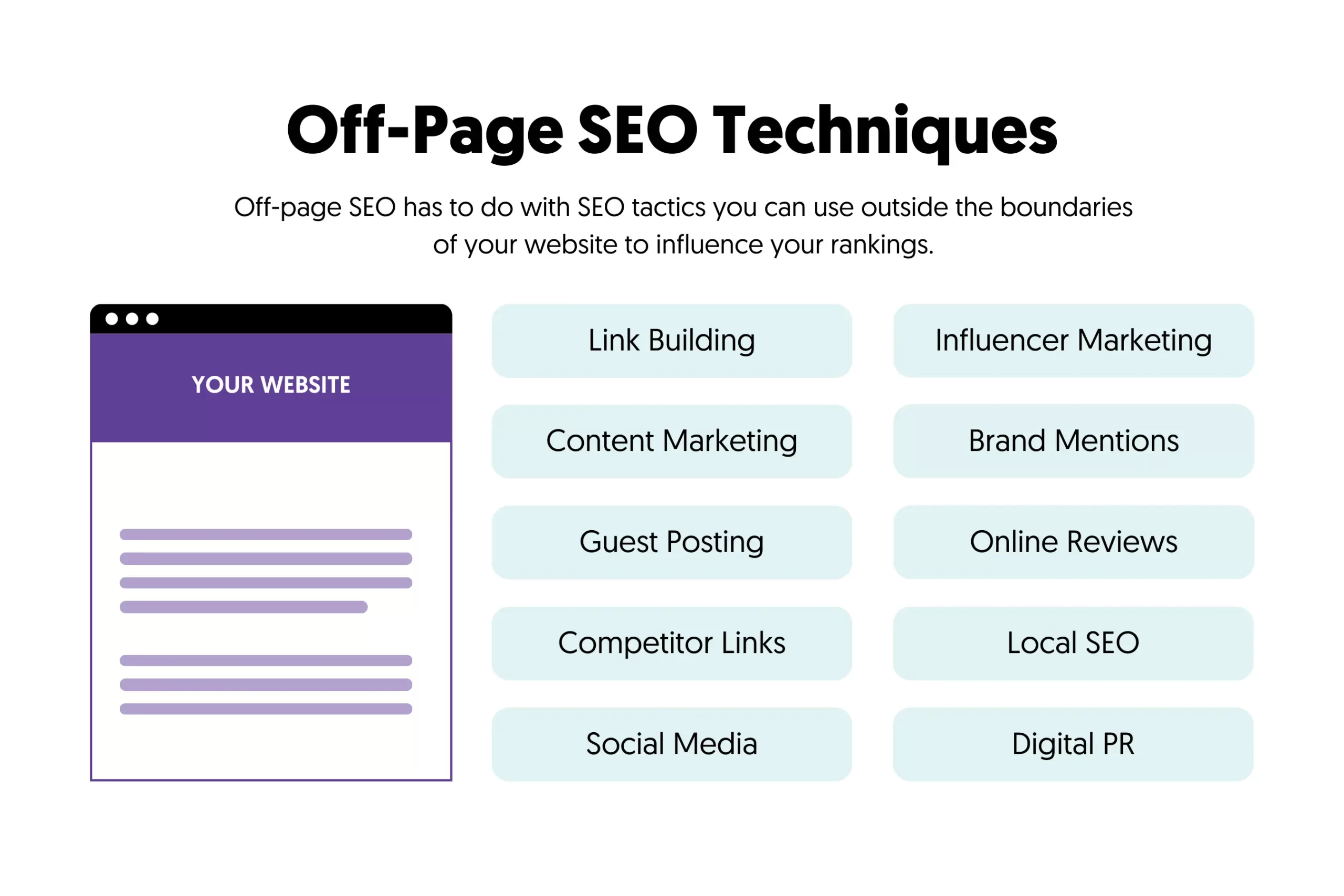
Backlink Building Strategies
Let’s delve deeper into one of the most critical aspects of off-page SEO: backlink building strategies. Backlinks remain a significant ranking factor for search engines. Acquiring high-quality backlinks is akin to receiving endorsements from reputable sources across the web. These links not only drive referral traffic but also significantly contribute to your domain authority and search engine rankings. To effectively build your backlink profile, it’s crucial to understand the different types of backlinks and actionable methods to acquire them.

Types of Backlinks
Not all backlinks are created equal. Understanding the types of backlinks will help you prioritize your efforts and focus on acquiring those that carry the most SEO value:
-
Editorial Links: These are considered the most valuable type of backlinks. Editorial links are earned naturally when other websites or bloggers cite your content as a source of information or inspiration. For example, if you publish a comprehensive guide or a groundbreaking study within your industry, other bloggers and journalists might link back to it when referencing your research. These links are organic and signify genuine appreciation for your content’s quality and authority.
-
Guest Post Links: As discussed earlier, guest posting involves contributing content to other websites. In most cases, you’ll have the opportunity to include links back to your website within the content body or author bio. Guest post links are a proactive way to build backlinks while also showcasing your expertise to a new audience. They are beneficial when placed on high-authority and relevant websites.
-
Forum Links: Online forums, particularly niche communities like Reddit threads or industry-specific forums, can be sources for backlinks. When you participate in discussions and provide valuable insights, you can naturally include relevant links to your website or content when it adds value to the conversation. However, exercise caution and avoid spammy link dropping, as this can be detrimental. Focus on contributing meaningfully and linking only when highly relevant.
-
Directory Links: Web directories, especially industry-specific directories like Yelp for local businesses or Crunchbase for startups, can provide valuable directory links. These directories categorize websites within specific niches, making it easier for users to find relevant resources. While directory links might not carry as much weight as editorial links, they can still contribute to your overall backlink profile, especially for local SEO and niche authority.
Actionable Methods
Now, let’s explore some actionable methods you can employ to build high-quality backlinks:

-
Broken Link Building: This is a highly effective and ethical backlink building tactic. It involves identifying broken links on other websites—particularly competitor sites or resources within your industry. Tools like Ahrefs or Moz can help you find these broken links. Once you find a broken link, check the content that used to be there and if you have a similar or better piece of content on your site, reach out to the website owner. Inform them about the broken link and politely suggest your content as a suitable replacement. Many website owners will be grateful for you pointing out the broken link and may happily replace it with a link to your relevant resource.
-
Competitor Backlink Analysis: Your competitors who rank well in search results likely have strong backlink profiles. Use tools like Ahrefs, Moz, or SEMrush to analyze your competitors’ backlink sources. Identify the websites that are linking to your competitors. Then, evaluate these sources to see if they would also be relevant and valuable sources for your website. This analysis can reveal potential backlink opportunities—websites to target for outreach or directories to list your site in.
-
Skyscraper Technique: Made famous by Brian Dean of Backlinko, the skyscraper technique involves three steps: First, find top-ranking content in your niche for a specific keyword you’re targeting. Second, create content that is significantly better—more comprehensive, more up-to-date, more visually appealing, and more actionable—than the existing top-ranking content (make it a “skyscraper”). Third, reach out to websites that are already linking to the original, less comprehensive content and promote your superior “skyscraper” content as a better resource. Explain why your content is more valuable and why it would be a better fit for their readers. This technique leverages existing link equity and offers linkers a more valuable resource to point to.
-
Industry Directories Submission: Identify trusted and reputable industry-specific directories relevant to your niche. For instance, if you’re in the tech startup space, consider submitting your website to directories like Crunchbase. For local businesses, Yelp and similar directories are crucial. Ensure the directories you choose are high-quality and relevant to your industry. Avoid submitting to low-quality or spammy directories, as these can harm your SEO efforts.
Remember, tools like Ahrefs and Moz are invaluable for tracking your backlink profile, discovering new backlink opportunities, and monitoring your competitors’ strategies. For further reading and insights, consult resources from Konker and Gtechme.
Guest Posting for SEO
Let’s now focus on guest posting for SEO, a powerful technique for not only building backlinks but also establishing yourself as an authority and reaching new audiences. Guest posting, when done strategically, can yield significant benefits for your off-page SEO efforts. It’s more than just getting a backlink; it’s about building relationships, gaining exposure, and demonstrating expertise within your industry.

Step-by-Step Guide
To make the most of guest posting, follow these step-by-step guidelines:
-
Find High-Authority Blogs: The first and most crucial step is to identify high-authority blogs within your niche that accept guest posts. Use tools like SEMrush to filter websites by Domain Authority (DA). Aim for blogs with a DA of 30 or higher as a starting point, but prioritize relevance over DA alone. The blog should be genuinely relevant to your industry and target audience. You can also use Google search operators like “[your niche] + guest post”, “[your niche] + write for us”, or “[your niche] + guest author guidelines” to find blogs actively seeking guest contributors.
-
Craft Personalized Pitches: Once you’ve identified potential blogs, the next step is to craft compelling email pitches. Personalization is key here. Avoid generic, mass emails. Instead, take the time to research each blog and editor. Start by mentioning something specific you liked about their blog. For example: “Hi [Name], I loved your recent article on [topic] – particularly [specific point you liked]…” Then, propose your guest post idea. Make sure your idea is relevant to their audience and hasn’t been recently covered on their blog. Example pitch structure: “Hi [Editor Name], I’m [Your Name] from [Your Website]. I’ve been a long-time reader of [Blog Name] and particularly enjoyed your articles on [Topic 1] and [Topic 2]. I have an idea for a guest post that I think would resonate well with your audience: [Your Guest Post Idea – e.g., “How to Optimize Off-Page SEO in 2024”]. It would cover [briefly outline key points]. I believe this topic aligns well with your blog’s focus on [Blog’s Main Focus].” Keep your pitch concise, clear, and value-driven.
-
Create Value-Driven Content: If your pitch is accepted, focus on creating high-quality, value-driven content that aligns with the blog’s style and audience. Don’t treat guest posts as mere link-building opportunities. Aim to provide genuine value to the readers. Offer actionable advice, insightful perspectives, or in-depth guides. For instance, a topic like “How to Optimize Off-Page SEO in 2024” (as mentioned in the pitch example) is timely and practical. Remember to naturally incorporate backlinks to your website within the content where relevant and valuable, perhaps linking to a relevant page or resource on your site, such as a guide on creating SEO-friendly blog posts. Always adhere to the blog’s guest post guidelines regarding formatting, word count, and link placement.
-
Maintain Relationships: Guest posting is also about building relationships. After your post is published, engage with comments, thank the editor, and share your guest post on your social media channels, tagging the blog. Follow up with the editor in the future, perhaps offering additional guest post ideas or suggesting other forms of collaboration. Building positive relationships with blog editors can open doors to future guest posting opportunities and collaborations.
A critical point to avoid is guest posting on low-quality or irrelevant blogs simply for the sake of backlinks. Prioritize relevance and authority to protect your website’s reputation and ensure your guest posting efforts yield positive SEO results. Refer to Konker’s guide for more tips on effective guest posting strategies.
Influencer Outreach for SEO
Moving on to another powerful off-page SEO technique, let’s discuss influencer outreach for SEO. In today’s digital world, influencers hold significant sway. Partnering with the right influencers can amplify your brand’s reach, build credibility, and drive valuable backlinks and social signals. Influencer outreach is about leveraging the authority and audience of established figures in your industry to enhance your SEO efforts.
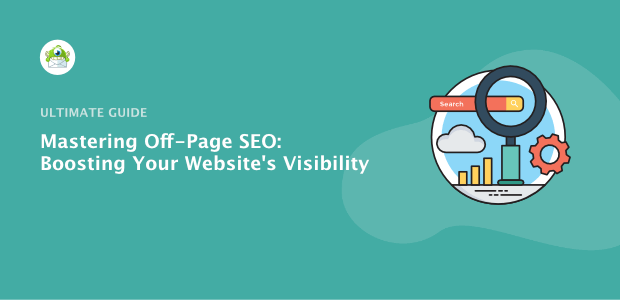
Effective Strategies
To execute influencer outreach effectively for SEO, consider these strategies:
-
Identify Relevant Influencers: The first step is to identify influencers who are genuinely relevant to your niche and target audience. Use tools like BuzzSumo to find influencers who have engaged audiences and are actively sharing content related to your industry. Look beyond just follower count. Focus on engagement rate, relevance of their content, and the authenticity of their influence. Consider different types of influencers – micro-influencers (smaller, highly engaged audiences), macro-influencers (larger audiences), and even industry experts or thought leaders.
-
Personalize Your Outreach: Just like with guest posting pitches, personalization is paramount in influencer outreach. Avoid generic outreach messages. Take the time to research each influencer, understand their content, and identify their areas of expertise. Reference specific posts or campaigns of theirs that resonated with you. Example pitch: “Hi [Name], I came across your recent post on [topic] and found your insights on [specific point] particularly valuable. At [Your Company], we’re working on [related project/content]. I believe your audience would be highly interested in this. We’re planning a webinar about [webinar topic], and your expertise in [influencer’s area of expertise] would be a fantastic addition.” A personalized approach demonstrates that you genuinely value their work and are not just seeking a transactional promotion.
-
Co-create Valuable Content: Influencer collaborations should be mutually beneficial. Propose opportunities for co-creating valuable content together. This could include: Interviews: Interview an influencer for your blog or podcast. Case Studies: Feature an influencer’s success story or expertise in a case study. Joint Guides or Ebooks: Collaborate on creating in-depth guides or ebooks. Webinars or Live Sessions: Co-host a webinar or live Q&A session. Ensure that these collaborations naturally include backlinks to your website, perhaps within the content itself or in the promotional materials. For instance, in a joint guide about local SEO strategies, you could naturally link to your service page on local SEO for service-based businesses.
-
Build Long-Term Relationships: Influencer outreach is not just about one-off collaborations. Aim to build long-term relationships with influencers in your niche. Engage with their posts regularly, share their content, and participate in their communities. Genuine engagement helps you stay on their radar and fosters a stronger connection, potentially leading to more collaborative opportunities in the future.
Remember to always disclose any sponsored content or partnerships transparently, adhering to FTC guidelines and maintaining authenticity in your influencer collaborations. For more insights on influencer marketing in SEO, resources from Moz are highly recommended.
Social Bookmarking Sites List & Best Practices
Let’s explore the realm of social bookmarking sites and learn about best practices for leveraging them effectively. Social bookmarking, while often overlooked, can still be a valuable component of a well-rounded off-page SEO strategy. These platforms offer a way to distribute your content, drive traffic, and generate social signals that can indirectly benefit your SEO.

